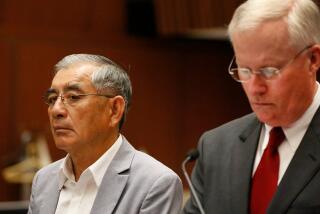FEC Won’t Try to Penalize 36 for Excess Campaign Donations
- Share via
WASHINGTON — Citing restraints on its investigative capability, the Federal Election Commission has dismissed complaints against 36 wealthy Americans who exceeded the $25,000 annual limit on federal campaign contributions.
The FEC action, taken Nov. 14 in a closed-door meeting, was disclosed Tuesday by the Center for Responsive Politics, a nonpartisan watchdog group that filed papers in January accusing 64 individuals of violating campaign reform laws.
The center was highly critical of the FEC for failing to pursue penalties against eight contributors who surpassed the federal ceiling by more than $20,000.
“Our fear is the dropping of cases sends a signal to wealthy political donors that the laws are not always going to be enforced and they can easily take their chances and exceed the limits without worrying about any penalty,” said Elizabeth Hedlund, director of the center’s FEC Watch Project.
The excess contributions were first uncovered a year ago by The Times, which reported that 109 individual donors had exceeded the limit in 1992.
So far, the FEC has levied a $35,000 fine on William C.W. Mow, chairman of Bugle Boy Jeans in Los Angeles, and penalties ranging from $28,000 to $15,000 on three others, including retired Hewlett-Packard Co. chief executive David Packard, for violating campaign laws. Complaints against 24 individuals are pending.
The dropped cases include several prominent Californians, among them Robert A. Daly, chairman of Warner Bros. Inc.; Don Henley of Beverly Hills, a member of the rock group the Eagles; and Jerome S. Moss, founder of A&M; Records.
The six-member commission voted to drop the complaints for a variety of reasons, including lack of evidence and recognition that some offenders had solicited refunds. But the most important factor was the FEC’s inability to handle an overloaded docket of complaints.
“The commission dismissed the cases because the bottom line is other cases took priority,” said FEC spokesman Ron Harris. “Our workload simply dictated that we had to get rid of some.”
Created in 1975 to enforce federal campaign finance laws, the FEC has 316 employees and a $27.2-million budget.
More to Read
Get the L.A. Times Politics newsletter
Deeply reported insights into legislation, politics and policy from Sacramento, Washington and beyond. In your inbox twice per week.
You may occasionally receive promotional content from the Los Angeles Times.










